Many people with ADHD reach for a cup of coffee when they take their medication. It feels natural-both are stimulants, both promise focus. But mixing caffeine with ADHD meds like Adderall isn’t just a harmless habit. It’s a pharmacological tightrope. One step too far, and you’re dealing with jitters, heart palpitations, or worse. Too little, and you miss out on the subtle boost that might help you stay on track. The truth? This combo can work-if you know exactly what you’re doing. But for most, it’s a gamble with their health.
How Caffeine and ADHD Medications Work Together
Caffeine and amphetamine-based ADHD medications like Adderall both push dopamine and norepinephrine in the brain. That’s why they both help with focus. But here’s the catch: Adderall is a precision tool. It’s dosed in milligrams calibrated to your weight, metabolism, and symptoms. Caffeine? It’s a wild card. A cup of coffee can range from 60 to 200 mg of caffeine depending on the bean, brew, and size. A soda? Maybe 40 mg. An energy drink? Could be 200 mg or more. And you never know how your body will react.
Studies show Adderall is 3 to 5 times more effective than caffeine alone for managing core ADHD symptoms like inattention and impulsivity. Caffeine might help you feel alert, but it doesn’t fix the brain’s executive function gaps the way prescription stimulants do. Still, some people report better focus when they pair the two. That’s not magic-it’s chemistry. Caffeine can slightly boost the effect of Adderall, especially in the first few hours. But that synergy cuts both ways.
The Hidden Risks: When Synergy Turns Dangerous
The biggest danger isn’t feeling too wired. It’s your heart. Both caffeine and Adderall raise your heart rate and blood pressure. When you combine them, those effects don’t just add up-they multiply. A 2022 study from Johns Hopkins found that people using both had a 37% higher risk of tachycardia and a 29% higher risk of hypertension compared to those taking Adderall alone. For someone with undiagnosed heart issues-which affects about 23% of adults with ADHD-that’s a serious threat.
And it’s not just adults. The American Academy of Pediatrics explicitly warns against mixing caffeine with stimulants in children and teens. Their developing nervous systems are more sensitive. A teenager drinking an energy drink before school and then taking their Adderall? That’s a recipe for panic attacks, chest pain, or even fainting.
Even if your heart is fine, the nervous system takes a hit. Anxiety spikes. Sleep shatters. You might feel sharp at 10 a.m., but by 3 p.m., you’re crashing-shaky, irritable, and exhausted. One Reddit user described it perfectly: “One cup of coffee with my 20mg Adderall feels amazing until hour three. Then I feel like I’m vibrating out of my skin.”

What the Data Says About Real-World Use
Surveys tell a messy story. In a 2023 analysis of 1,247 comments on r/ADHD, 62% of respondents said they regularly combine caffeine with their medication. Of those, 41% said it improved focus. But 59% reported worse anxiety, restlessness, or insomnia. Meanwhile, a National Alliance on Mental Illness (NAMI) survey found that 33% of adults who mixed caffeine and stimulants ended up needing medical care for side effects-three times higher than those who stuck to medication alone.
And it’s not just coffee. Hidden caffeine sources are everywhere: dark chocolate (about 20 mg per ounce), green tea (25-45 mg per cup), energy gels, pre-workout powders, and even some headache meds. People don’t realize they’re adding 100 mg of caffeine from a chocolate bar and another 80 mg from their afternoon tea. Suddenly, they’ve hit 300 mg-well over the FDA’s 400 mg daily limit for healthy adults-and they’re on top of their ADHD meds. That’s not a boost. That’s a overdose waiting to happen.
When It Might Actually Help (And How to Do It Safely)
There are exceptions. Some people find that a small amount of caffeine-around 100 mg, or one small coffee-helps smooth out the edges of their medication. A 2020 study on five boys with ADHD showed that adding L-theanine (a calming amino acid found in green tea) to caffeine improved focus and reduced impulsivity without the jittery side effects. The ratio? About 3:1 L-theanine to caffeine. Researchers are still testing this, but early results are promising.
If you want to try caffeine with your ADHD meds, here’s how to do it safely:
- Start low. No more than 100 mg of caffeine (one small coffee or one cup of strong tea). Don’t go higher until you’ve tried it for at least a week.
- Time it right. Wait 4 to 5 hours after taking your medication before drinking coffee. Caffeine’s half-life is about 5 hours. If you take Adderall at 7 a.m. and coffee at 9 a.m., you’re doubling down when both are peaking.
- Track everything. Use a simple journal: time of medication, caffeine intake (include type and amount), heart rate (use a smartwatch), and mood/focus on a scale of 1-10. After two weeks, you’ll see patterns.
- Watch for red flags. If you feel your heart racing, get shaky, can’t sleep, or feel more anxious than usual-stop. Talk to your doctor.
- Avoid energy drinks and supplements. They often contain unregulated doses of caffeine and other stimulants. The FDA has warned about these products since 2022.
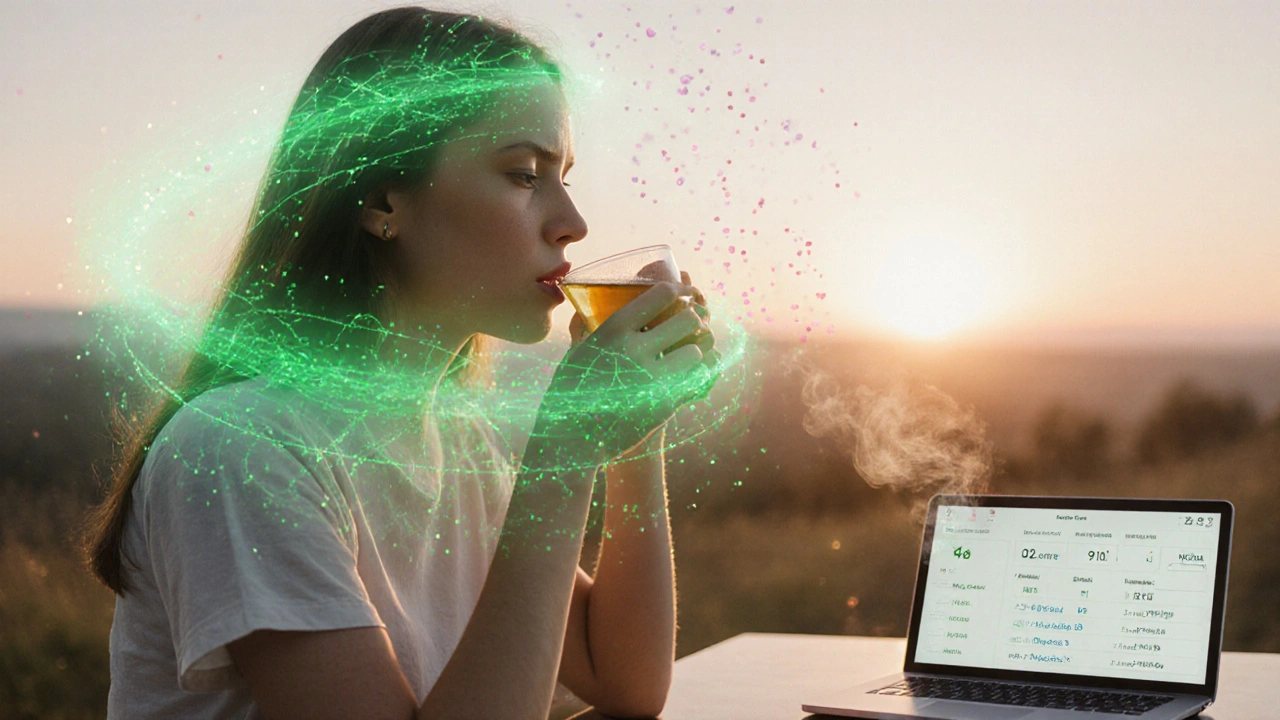
What Your Doctor Needs to Know
Many patients don’t tell their doctors they’re drinking coffee with their Adderall. They assume it’s harmless. But your doctor needs this info to spot early signs of overstimulation or cardiovascular strain. If you’re on Adderall and regularly consume caffeine, your doctor might recommend:
- A baseline ECG to check your heart rhythm
- Monitoring your blood pressure at home
- Testing your CYP1A2 gene variant-about 40% of people are slow metabolizers of caffeine, meaning it stays in their system longer and increases risk
- Switching to a non-stimulant ADHD medication like atomoxetine if side effects persist
There’s no shame in asking. In fact, the FDA’s 2024 draft guidance says doctors should routinely ask patients about caffeine use when prescribing stimulants. It’s part of responsible care now.
The Bottom Line: Don’t Guess. Test.
Caffeine isn’t the enemy. But treating it like a harmless sidekick to your ADHD medication is dangerous. The synergy isn’t magic-it’s measurable, and it’s risky. For most people, the side effects outweigh the benefits. If you’re going to use caffeine, do it with eyes wide open: low dose, good timing, careful tracking, and full transparency with your doctor.
And if you’re thinking of switching to caffeine instead of medication? Don’t. It’s not a substitute. Studies show caffeine is 60-70% less effective than prescription stimulants for core ADHD symptoms. You’re not saving money-you’re trading real relief for temporary buzz.
The goal isn’t to eliminate coffee. It’s to use it wisely. Your brain-and your heart-will thank you.
Can I drink coffee while taking Adderall?
Yes, but with caution. A small amount-100 mg or less (about one small coffee)-taken 4-5 hours after your Adderall dose may help focus without causing major side effects. Never combine them right after taking your medication. Avoid energy drinks, pre-workout supplements, or multiple cups of coffee. Track your heart rate and anxiety levels. If you feel jittery, anxious, or your heart races, stop.
Does caffeine make ADHD medication stronger?
It can amplify the effects, but not always in a good way. Both caffeine and Adderall increase dopamine and norepinephrine. Together, they can boost focus for some people-but they also raise heart rate and blood pressure more than either does alone. This can lead to anxiety, insomnia, or even dangerous cardiovascular stress. It’s not a reliable way to make your medication work better.
Is caffeine safe for kids with ADHD?
No. The American Academy of Pediatrics advises against using caffeine with ADHD medications in children and teens. Their nervous systems are still developing, and combining stimulants increases the risk of anxiety, sleep problems, and heart issues. Even small amounts from soda or chocolate can interfere with medication effectiveness and safety.
What’s the safest amount of caffeine with ADHD meds?
Start with 100 mg per day-about one small cup of brewed coffee. Don’t exceed 200 mg unless your doctor approves it. Remember: caffeine is also in tea, chocolate, energy drinks, and some pain relievers. Add those up. The FDA’s safe daily limit is 400 mg for healthy adults, but if you’re on Adderall, staying under 200 mg is wiser.
Can L-theanine help reduce caffeine side effects with ADHD meds?
Early research suggests yes. A 2020 study showed that combining 160 mg of caffeine with 200 mg of L-theanine improved focus and reduced impulsivity in ADHD patients without increasing anxiety. L-theanine helps calm the nervous system while caffeine boosts alertness. You can get it from green tea or supplements, but talk to your doctor before starting any new supplement, especially with prescription meds.
How long should I wait between caffeine and Adderall?
Wait at least 4 to 5 hours. Caffeine peaks in your bloodstream about 30-60 minutes after drinking it and has a half-life of 5 hours-meaning half of it is still in your system after that time. Adderall lasts 10-13 hours. Taking them too close together means both are active at the same time, increasing side effect risks. Spacing them out reduces strain on your heart and nervous system.
What are the signs I’m taking too much caffeine with my ADHD meds?
Watch for: heart palpitations, chest tightness, dizziness, severe anxiety, shaking hands, trouble sleeping, or feeling overly wired then crashing hard. If you notice any of these, stop caffeine immediately and contact your doctor. In extreme cases, it can lead to high blood pressure, arrhythmias, or panic attacks requiring emergency care.
Should I stop caffeine if I’m on ADHD medication?
Not necessarily-but you should be intentional. If caffeine helps you focus without side effects, you can keep it in small doses. If it makes you anxious, restless, or sleepless, cut it out. Many people feel better without it. The key is not to assume it’s harmless. Track your experience. Talk to your doctor. Your brain and heart deserve more than guesswork.



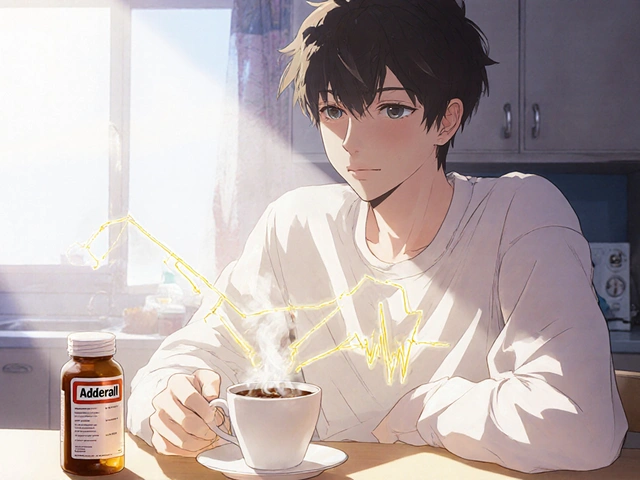
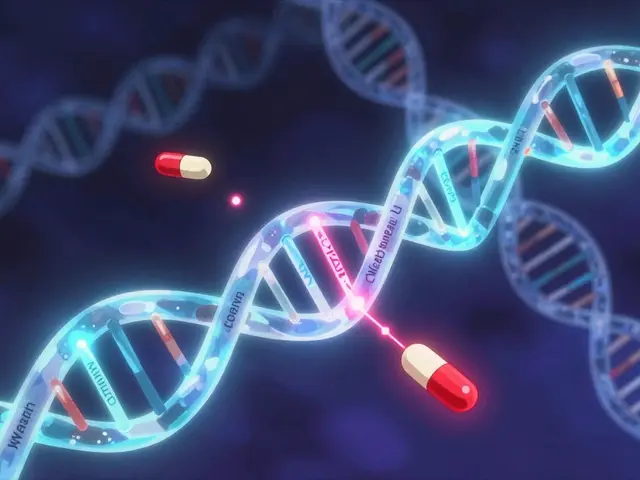
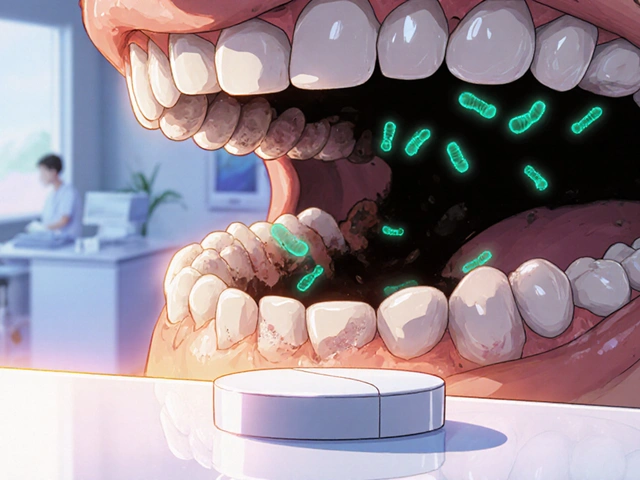
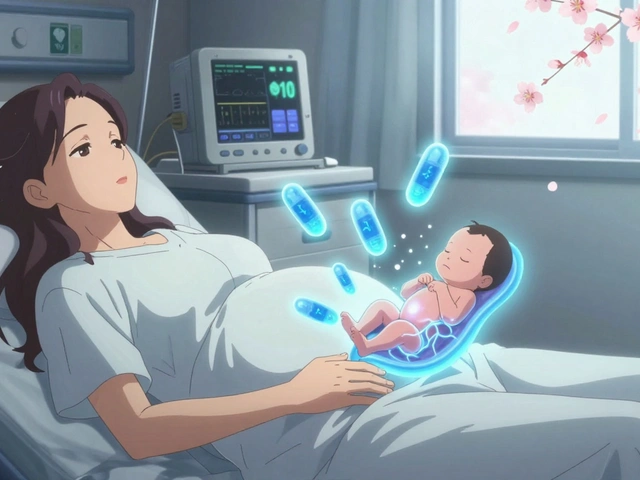

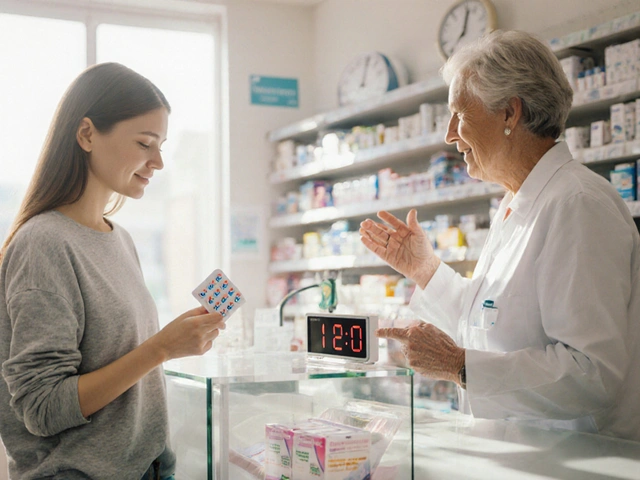
Comments (8)
Joseph Peel
November 18, 2025 AT 10:04 AMCaffeine and stimulant synergy is a well-documented pharmacokinetic interaction. The CYP1A2 enzyme polymorphism significantly modulates caffeine metabolism, and when combined with amphetamine, the risk of cardiovascular strain escalates due to additive adrenergic stimulation. Clinical guidelines from the American Heart Association explicitly caution against concurrent use without cardiac screening. This isn't opinion-it's evidence-based medicine.
satya pradeep
November 18, 2025 AT 18:17 PMbro i take 20mg adderall and one black coffee at 9am and its perfect. no jitters, no crash. i just dont drink after 2pm. if you cant handle it dont blame the coffee. also green tea is way better than energy drinks lol
Kelsey Robertson
November 20, 2025 AT 10:41 AMOh, so now we’re pretending caffeine is the villain? Let me guess-you also think sunlight causes skin cancer because UV rays exist. This whole article reads like a pharmaceutical lobby pamphlet. People have been drinking coffee with Adderall since the 90s. If your body can’t handle 100mg of caffeine while on a 10mg dose of Adderall, maybe you’re the problem-not the coffee. And L-theanine? That’s not ‘early research’-it’s been used in Japan for decades. Your fear-mongering is exhausting.
Joseph Townsend
November 22, 2025 AT 04:31 AMI once took Adderall and a Monster Energy drink and thought I was gonna levitate out of my skin. My heart was doing the cha-cha. I had to lie on the floor for an hour waiting for the world to stop spinning. I haven’t touched an energy drink since. But? I still have one cup of black coffee. Just… not at the same time. That’s the real secret. Don’t be a hero. Be smart.
Elia DOnald Maluleke
November 22, 2025 AT 17:16 PMHerein lies the tragedy of modern neuropharmacology: we seek to optimize cognition, yet we do so with substances that were never designed for precision engineering. Caffeine, a natural alkaloid, and amphetamine, a synthetic psychostimulant-both act upon the same neurotransmitter pathways, yet one is brewed from beans, the other synthesized in labs. The irony? We treat the former as harmless and the latter as dangerous, when both carry the same potential for chaos in an unmonitored system. We are not merely users-we are unwitting participants in a biochemical experiment with no control group.
Sridhar Suvarna
November 23, 2025 AT 21:11 PMAs someone who has managed ADHD for 18 years and worked in pharmacology, I’ve seen too many patients crash from this combo. Start with 50mg caffeine max. Wait 5 hours. Track heart rate. If you feel like your chest is vibrating, stop. It’s not about willpower-it’s about neurochemistry. Your body isn’t broken. It’s just signaling you to slow down.
Prem Hungry
November 24, 2025 AT 15:20 PMu guys are overthinking this. one cup coffee. not with meds. 4 hrs later. if u feel fine u good. if u feel like ur gonna explode? stop. simple. no need for studies. listen to ur body. its smarter than any article
Bill Machi
November 25, 2025 AT 00:21 AMLet’s be real. This isn’t about health. It’s about control. Big Pharma doesn’t want you drinking coffee with your meds because then you might question why you need $300/month pills at all. Caffeine is cheaper. It’s legal. It’s been around for centuries. The real danger isn’t caffeine-it’s the system that profits from making you feel like you need to be medicated to function.